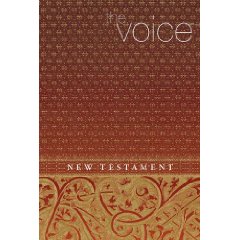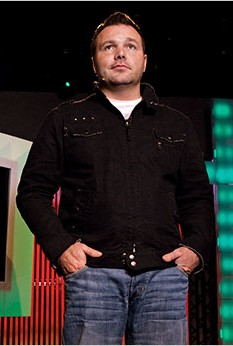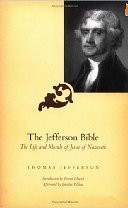 I admit to my skepticism. Knowing something about the people who were behind this book (specifically Seay and McLaren), I suspected an almost heretical re-write of the New Testament, that would be fully reflective of their emergent and post-modern sensitivities.
I admit to my skepticism. Knowing something about the people who were behind this book (specifically Seay and McLaren), I suspected an almost heretical re-write of the New Testament, that would be fully reflective of their emergent and post-modern sensitivities.
At least some of it’s sponsors, proponents and spokespersons are not folks for whom I would use the term “orthodox” when describing their Christian theology. Consequently, their plans to produce a “modern” translation of the New Testament sounded like a disaster in the making. My hunch was that they would produce a paraphrase of the New Testament with a clear editorial leaning toward their predisposition for relativism and what I would describe as squishy doctrine, particularly in the areas of man’s sinfulness, the exclusivity of Christ, and His substitutionary atonement, the virgin birth and a variety of other matters that tend to characterize the “conversations” that go on in their stream of contemporary Christianity.
While I have not read The Voice cover to cover, I have read a substantial amount of it, and certainly enough, to say that I am surprised, in fact I am pleasantly surprised at what I found. Now let me quickly add that there are some peculiar things about The Voice, one in particular that I am bothered by. But on the balance, it really is not what I had anticipated.
The Voice reads like something of a hybrid between The Message, and The New Living Translation of the Bible. It is clear from reading that it is not fully a paraphrase like Eugene Peterson’s re-write of scripture. For one thing, it at least uses the modern convention of a chapter and verse structure and the verses are not long strung out commentary like The Message. But The Voice falls short, doubtlessly on purpose, of the more formal and traditional presentation of the dynamic equivalence of the NLT.
Since I had my suspicions going in, that The Voice would be filled with content that could not be traced to any ancient manuscript, I give high marks to the publishers and editors of The Voice for their integrity with respect to how they have inserted their views into the text. Whenever there is content NOT traceable to the original language, even within the framework of a dynamic translation, the editors have italicized the print. This editorial decision does not really distract from the reading of the text after you get used to it, but clearly discloses what is purely editorial content, from what is a translation of the Greek. It did take a little while to get used to it, as there are occasions when italicized print in other writing is intended to communicate emphasis, which is not the case in The Voice.
In a similar vein, the commentary in The Voice is not at the bottom of the page, like a footnote, it is positioned in the text itself. However, these comments are marked off in an outlined box, clearly distinguishing them from the translated scriptural content.
And while The Voice is presumably intended to be a more “user friendly” Bible for the postmodern generation, it does not exclude important theological terms, such as grace, reconciliation, redemption, and justification, as I might have expected, although these more formal terms are occasionally replaced with other words that have a lower theological resonance.
Probably the most unusual thing I noticed when reading The Voice, is the absence of the word “Christ.” Using both an ESV Study Bible concordance and a complete NIV concordance, I looked through all 27 books of the New Testament, and could find only ONE occasion when The Voice uses the word “Christ.” That verse was John 1: 41 when Andrew reported to Peter that they had “found the Messiah. (which means Christ).” Even in the three synoptic Gospels, where Peter confesses the Christ, in Matthew 16, Mark 8, and Luke 9, The Voice uses expressions such as “Liberating King” or “Liberator” as a substitute for “Christ.” And throughout Paul’s letters to the churches and his young proteges, with his frequent use of the word “Christ”, Liberating King is the word choice in The Voice.
I have to wonder what is going on with this. I will conceded that “Liberating King” is not wholly inaccurate, but also a little unusual. Are the writers, editors and publishers simply trying to be trendy, or edgy in their references to Christ as an appeal to their target audience? Or is this supposed to somehow be provocative? Is the word “Christ” so confusing to the target audience for this Bible that the editors have intentionally exchanged the word for something that is less so? Or is the word “Christ” considered to be so offensive to the postmodern intellect that it might repel people from the reading of scripture?
I have to admit that the obvious effort to avoid the word “Christ” was noticeable and became somewhat unsettling, leaving me to suspect the motives of producers of The Voice. I cannot help but speculate on the possibility that by adopting Liberator or Liberating King as euphemisms for Christ, they are trying to re-frame His office as exclusively king and savior, all the while minimizing His future role as judge.
Not as bad as I had anticipated, but falling short of a Bible I could recommend, The Voice will likely be embraced by far too many because of its easy reading style, and to some degree its trendy jargon that will likely appeal to the postmodern mind.







 Posted by Chuck
Posted by Chuck 
 I admit to my skepticism. Knowing something about the
I admit to my skepticism. Knowing something about the  A regular package of M & M milk chocolate candies, not a part of a seasonal promotion contains the colors in the proportions shown below.
A regular package of M & M milk chocolate candies, not a part of a seasonal promotion contains the colors in the proportions shown below.  It is from this bias against the canon of scripture that Jefferson created his own bible. The process in his own words…”I had sent to Philadelphia to get two (New) testaments Greek of the same edition, and two English with a design to cut out the morsels of morality, and paste them on the leaves of a book.” [emphasis mine] When the Bibles arrived, he found out that he had received the Greek and English, and also a Latin Bible. For some reason, Jefferson also added a French version. After numerous starts and stops, Jefferson finally completed his cut and paste bible in 1820 at the age of 77. He called it “The Life and Morals of Jesus of Nazareth”. It is an interesting compilation of scripture verses, jumping from one Gospel account to another, combining and mixing as suited Jefferson to create a flow of Jesus’ life and his moral teachings.
It is from this bias against the canon of scripture that Jefferson created his own bible. The process in his own words…”I had sent to Philadelphia to get two (New) testaments Greek of the same edition, and two English with a design to cut out the morsels of morality, and paste them on the leaves of a book.” [emphasis mine] When the Bibles arrived, he found out that he had received the Greek and English, and also a Latin Bible. For some reason, Jefferson also added a French version. After numerous starts and stops, Jefferson finally completed his cut and paste bible in 1820 at the age of 77. He called it “The Life and Morals of Jesus of Nazareth”. It is an interesting compilation of scripture verses, jumping from one Gospel account to another, combining and mixing as suited Jefferson to create a flow of Jesus’ life and his moral teachings.
You must be logged in to post a comment.